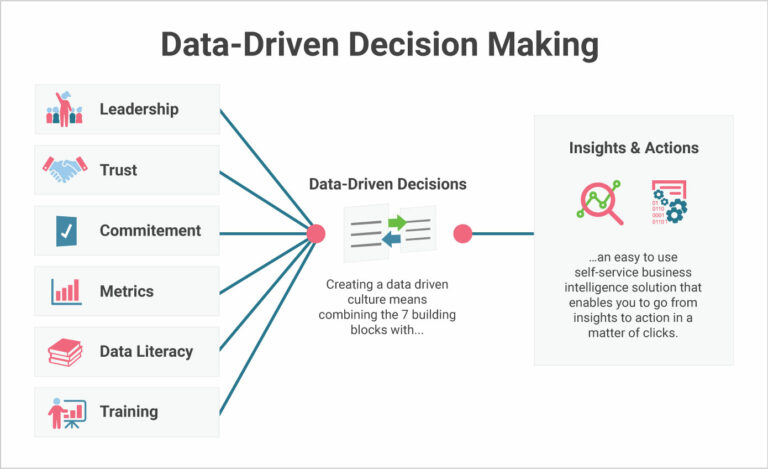
Data-driven decision making is becoming increasingly important for businesses to remain competitive in today's digital age. By using analytics to analyze large volumes of data, businesses can gain insights that inform their decision making and drive innovation. In this article, we'll explore the ways in which data-driven decision making is revolutionizing business.
The Role of Analytics in Data-Driven Decision Making
Analytics involves the use of advanced tools and techniques to analyze large volumes of data to uncover insights and patterns. This data can come from a variety of sources, including customer interactions, social media, and operational data. By analyzing this data, businesses can gain insights that inform their decision making and help them stay ahead of the competition.
The Benefits of Data-Driven Decision Making
There are many benefits of data-driven decision making:
- Improved Decision Making
Data-driven decision making enables businesses to make more informed decisions based on data and insights, rather than relying on intuition or guesswork. This can lead to better outcomes and a competitive advantage.
- Increased Efficiency
Data-driven decision making can help businesses identify inefficiencies in their operations and take action to address them. This can lead to increased efficiency and cost savings.
- Enhanced Customer Experience
Data-driven decision making can help businesses better understand their customers and their needs, enabling them to deliver a better customer experience. This can lead to increased customer loyalty and retention.
- Improved Innovation
Data-driven decision making can help businesses identify new opportunities for innovation and growth. By analyzing data and uncovering insights, businesses can develop new products and services that better meet the needs of their customers.
Examples of Data-Driven Decision Making in Business
There are many examples of businesses using data-driven decision making to drive innovation and stay ahead of the competition:
- Amazon
Amazon uses data-driven decision making to improve the customer experience. By analyzing data on customer behavior and preferences, Amazon can make personalized recommendations and improve the online shopping experience.
- Netflix
Netflix uses data-driven decision making to inform its content strategy. By analyzing data on what its users are watching, Netflix can develop new content that is more likely to be successful.
- Procter & Gamble
Procter & Gamble uses data-driven decision making to improve its supply chain operations. By analyzing data on inventory levels and production processes, P&G can optimize its supply chain to reduce costs and improve efficiency.
The Future of Data-Driven Decision Making
The future of data-driven decision making looks promising, with new tools and technologies on the horizon:
- Artificial Intelligence and Machine Learning
Artificial intelligence (AI) and machine learning (ML) are already being used in data-driven decision making, but the future will see an increase in their usage. AI and ML can help businesses analyze large volumes of data quickly and accurately, and can also be used to automate tasks such as data cleaning and processing.
- Internet of Things (IoT)
The Internet of Things (IoT) involves the use of connected devices that generate large volumes of data. By analyzing this data, businesses can gain insights into customer behavior and preferences, as well as improve their operations.
- Cloud Computing
Cloud computing has already transformed the way businesses store and access data, and the future of data-driven decision making will see even greater integration with the cloud. Cloud-based analytics can provide businesses with more storage and processing power, enabling them to analyze larger volumes of data more quickly and efficiently.
Conclusion
Data-driven decision making is revolutionizing business by enabling businesses to make more informed decisions based on data and insights. By using analytics to analyze large volumes of data, businesses can gain a competitive advantage, improve efficiency, enhance the customer experience, and drive innovation. As businesses continue to integrate new tools and technologies into their operations, the future of data-driven decision making looks promising.